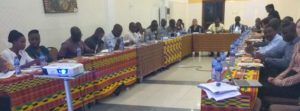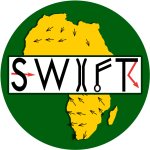 This week the SWIFT Users team is meeting in Accra for a dialogue with stakeholders. Hosted by the Ghana Meteorological Agency (GMet) and Kwame Nkrumah University of Science and Technology (KNUST), the discussion will focus on how best to support users’ understanding and use of weather /climate forecast and services in Ghana.
This week the SWIFT Users team is meeting in Accra for a dialogue with stakeholders. Hosted by the Ghana Meteorological Agency (GMet) and Kwame Nkrumah University of Science and Technology (KNUST), the discussion will focus on how best to support users’ understanding and use of weather /climate forecast and services in Ghana.
The meeting takes place 8-9 November and is led by Philip Antwi-Agyei (KNUST), Andrea Taylor (University of Leeds) and Maureen Ahiataku (GMet), together with SWIFT Programme Science Director, Elijah Adefisan (ACMAD) and Nicolas Fournier (UK Met Office). Stakeholders taking part include, representatives from government ministries and departments, delegates from operational forecasting agencies and industrial sectors such as oil an gas, national and international NGOs and academic research groups.
This is the first of four African SWIFT national dialogues with stakeholder groups, with similar events planned in Senegal, Nigeria and Kenya. The key aims of the Users work package are to:
- Examine the usefulness of existing forecast provision for decision making in climate sensitive sectors across nowcasting to seasonal timescales.
- Bring users and providers of forecasts together to identify how the usefulness and accessibility of forecasts products can be increased.
- Develop effective strategies for communicating forecasts to different users in climate sensitive sectors.
As stakeholders discuss their experiences of weather/climate impact within their sector (agriculture, fisheries, oil and gas, water resources, disaster management etc.), they are identifying what information they need from weather forecasts, and what support is required to enable them to use the information in making strategic decisions. A representative from the oil and gas sector has highlighted the challenges within Ghana to accessing marine-based weather data. A key question for all is, what forecast information is required, and by whom, to mitigate against the negative impacts of severe weather events.
For further information contact Philip Antwi-Agyei or Andrea Taylor via the links above.
